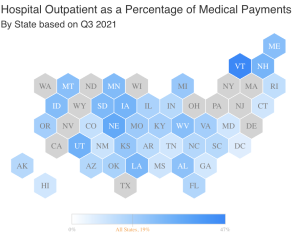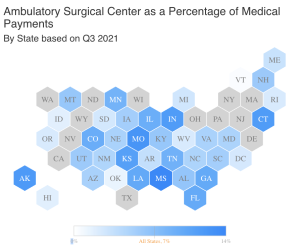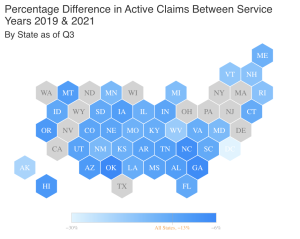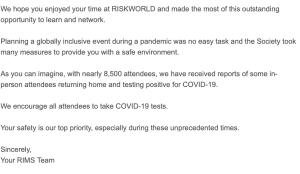Share This Article:
Quick as in this won’t take up much of your time, and “‘quick” as in how fast NCCI has published useful data.
NCCI’s Medical Indicators and Trends dashboard has been updated to include data up to September 2021…you can access it here. Kudos to NCCI for the timely updates; the fresher the data, the more actionable it is.
Couple key takeaways.
First, those darn facilities.
Ambulatory Surgery Centers (ASCs) and outpatient hospital care…
First, note that hospitals’ outpatient facilities account for almost one-fifth of all work comp medical payments…

while ASCs account for one-fourteenth of medical spend.

A big part of that differential is the cost of surgery…which cost about 70% more in hospital outpatient facilities than in ASCs.
Before anyone jumps to any conclusions, its critical to understand the nuance here…
The Florida WC fee schedule is very much slanted to benefit hospitals at the expense of everyone else (physicians in the Sunshine state have been screwed by the Three Member panel for years, while hospitals have been treated like royalty).
Second, ASCs do not handle complex cases and patients with significant health problems/co-morbidities…these patients must be treated at faciliteis that have access to emergent care resources incase something goes pretty wrong during or after surgery. So, case-mix is different.
More…
COVID’s impact continues…active claim counts were down an average of 13% from 2019 to 2020

And speaking of the guest who refuses to leave, this came across my virtual desk from a colleague who attended last week’s RIMS meeting…

I know of several folks who tested positive post-RIMS; if you went, please get tested.
Finally, Washington Labor and Industry is looking for physicians in various occupational medicine and related specialty positions…
What does this mean for you?
Quick access to actionable data is great; actually acting is even better.
By Joe Paduda
Courtesy of Managed Care Matters
More by This Author
- Feb 10, 2025
- WorkersCompensation.com
- Oct 02, 2024
- WorkersCompensation.com
- Jun 24, 2024
- WorkersCompensation.com
Read More
- Mar 26, 2025
- Liz Carey
- Jan 30, 2025
- Liz Carey
- Aug 12, 2024
- Frank Ferreri
- Aug 06, 2024
- Frank Ferreri
- Aug 05, 2024
- Frank Ferreri




